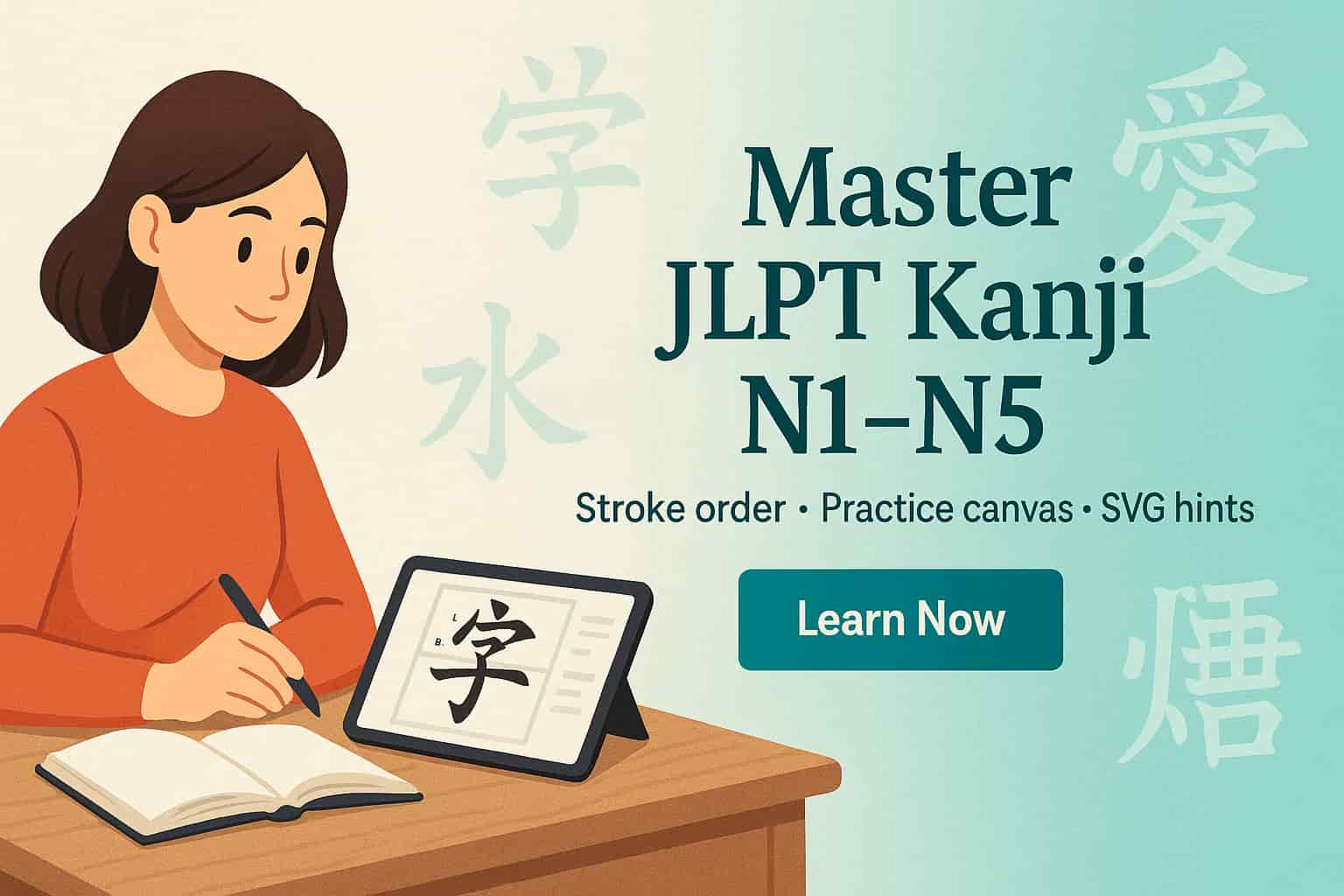Japan Work Visa Requirements: What You Need to Know
Please support us by sharing!
Thinking about working in Japan? Whether you’re an engineer, teacher, chef, or business manager, you’ll need the right work visa to start your career journey here. Japan has clear visa requirements, and meeting them is essential to get approval. In this guide, we’ll break down the basic eligibility, documents, and steps you need to know before applying in 2025.
Why Work Visa Requirements Matter
Japan takes its immigration process seriously, especially when it comes to work visas. Each visa type is designed for specific kinds of jobs, and the government checks carefully to make sure your skills, education, and work experience match the category you are applying for. For more details infomration, you can check this official website Ministry of foreign affairs of japan .
For example, if you apply for an engineering visa but your background is in hospitality, your application will likely be rejected. By understanding the requirements in detail before applying, you can prepare the right documents, choose the correct visa type, and avoid delays or costly reapplications. It’s not just about getting permission to work, it’s about ensuring you meet Japan’s professional standards from the very start.
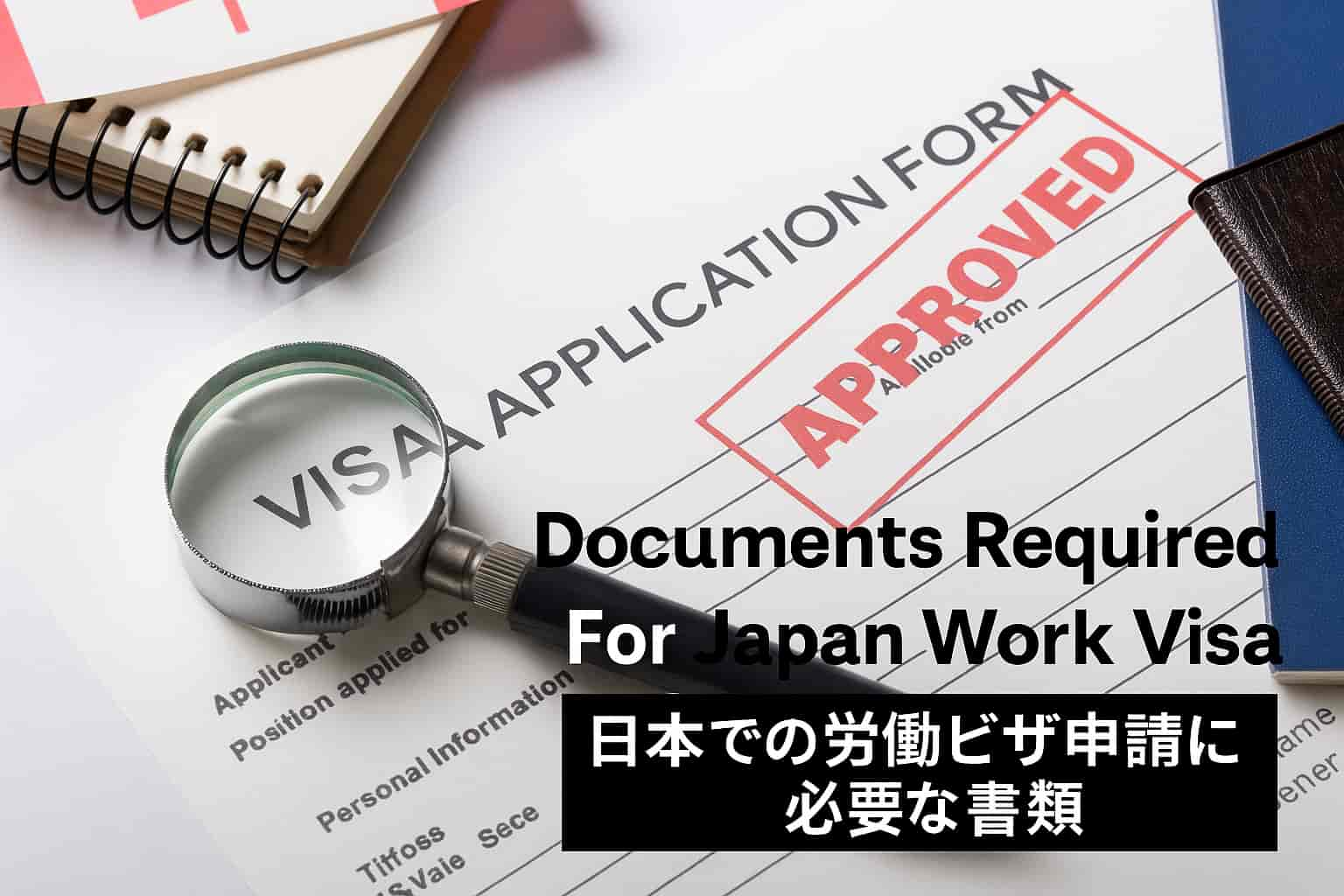
Basic Eligibility Criteria
Before you can apply for a Japan work visa, you need to meet certain basic requirements set by the Immigration Services Agency of Japan. These requirements ensure that foreign workers have the right skills, qualifications, and job offers to contribute to the country’s workforce. In most cases, you must meet at least one of the following:
- Educational Qualification: A university bachelor’s degree or higher in a field directly related to your job in Japan. For example, if you are applying for an “Engineer/Specialist in Humanities/International Services” visa, your degree should be in engineering, IT, business, or another relevant subject.
- Work Experience: If you do not have a degree, you can qualify through significant professional experience—usually 10 or more years in your field for technical or skilled positions. This experience must be proven through employment records, contracts, or reference letters.
- Job Offer: You must have a confirmed job offer from a registered Japanese company or organization. The employer must be willing to act as your visa sponsor, which means they will submit certain documents to immigration on your behalf.
Some visa categories, such as the Specified Skilled Worker (SSW), also allow applicants to qualify through industry-specific skills tests instead of a university degree. These tests are often paired with Japanese language requirements, so basic language ability can increase your chances of success.
Documents Required if You Are Applying from Outside Japan
If you are currently living outside Japan and applying for a work visa for the first time, you’ll need to submit your application to the Japanese embassy or consulate in your home country. In most cases, your future employer in Japan will handle part of the process by obtaining a Certificate of Eligibility (COE) on your behalf.
Check out our guide on Japanese companies that hire foreign workers to explore potential employers before you apply.
Here’s what you’ll generally need:
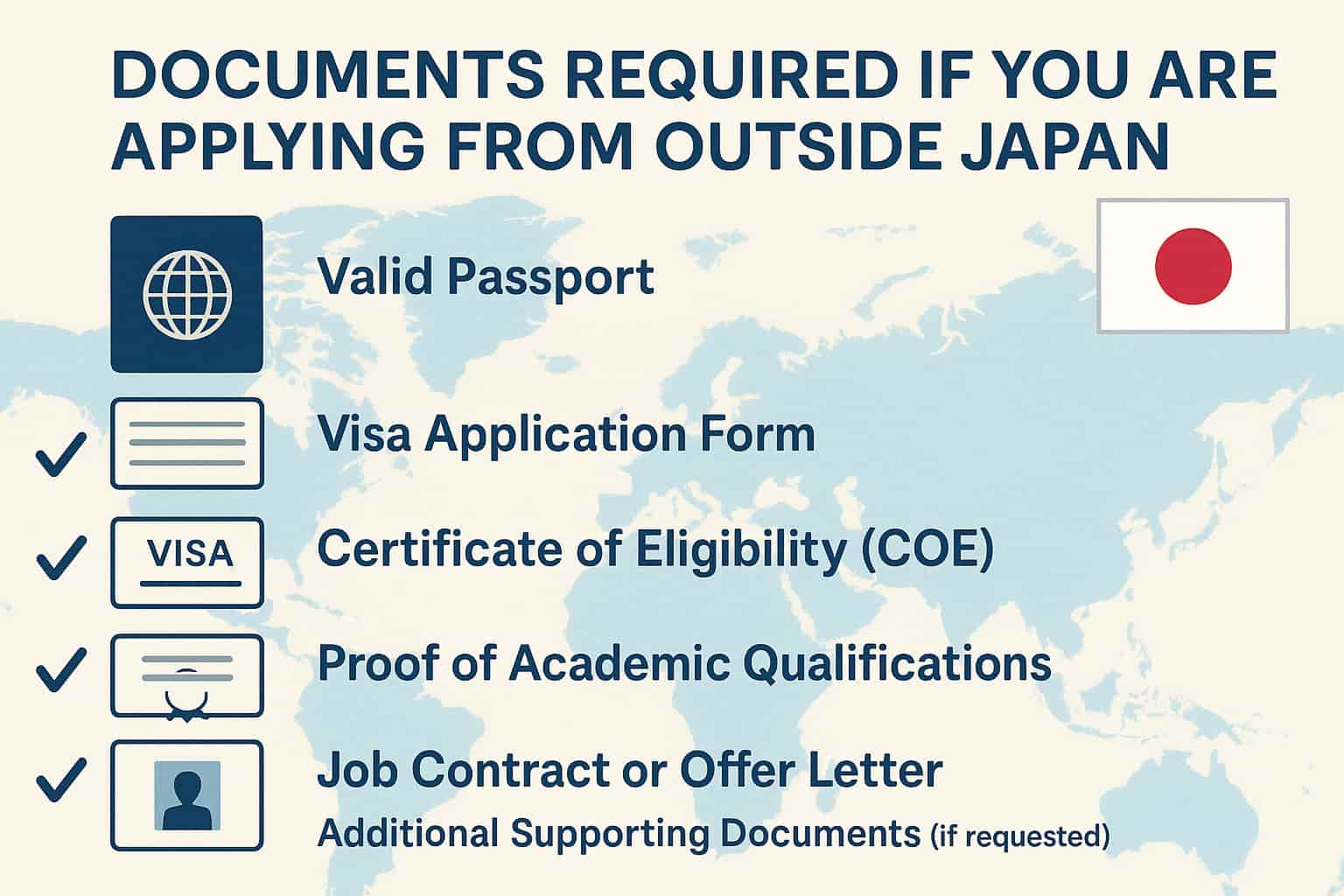
- Valid Passport: Must have at least 6 months of validity remaining from your planned arrival date in Japan. If it’s close to expiring, renew it before starting your application.
- Visa Application Form: Completed and signed, available from your local Japanese embassy or consulate website. Attach a recent passport-sized photo (taken within 6 months) that meets official photo requirements such as background color, size, and facial expression.
- Certificate of Eligibility (COE): Issued by the Immigration Services Agency of Japan, usually arranged by your employer. This document confirms you meet the conditions for the work visa category. The original COE (or a certified copy) must be included with your application.
- Proof of Academic Qualifications: Certified copies of your degrees, diplomas, or transcripts that relate to your job in Japan. If documents are not in English or Japanese, you may need a certified translation.
- Proof of Work Experience: Employment reference letters, certificates, or a portfolio that demonstrates your relevant skills. For highly skilled professions, this might include technical licenses or certifications.
- Job Contract or Offer Letter: A signed agreement from your Japanese employer showing job title, salary, duties, and contract period.
- Additional Supporting Documents (if requested): This can include a health certificate, criminal record check, or Japanese language ability proof, depending on your visa type and embassy requirements.
Once approved, you will receive your work visa stamped in your passport. You can then travel to Japan and receive your residence card upon arrival at the airport.
Documents Required if You Are Changing Status to a Work Visa in Japan
If you are already in Japan on a different visa type (such as student, dependent, or working holiday) and you receive a job offer, you will need to apply for a “Change of Status of Residence” at the nearest immigration office in Japan.
Unlike applying from abroad, you won’t need to leave the country, but you must prepare all required documents carefully and submit them directly to immigration. Missing or incomplete paperwork can lead to long delays or even rejection. Here’s what you’ll generally need:
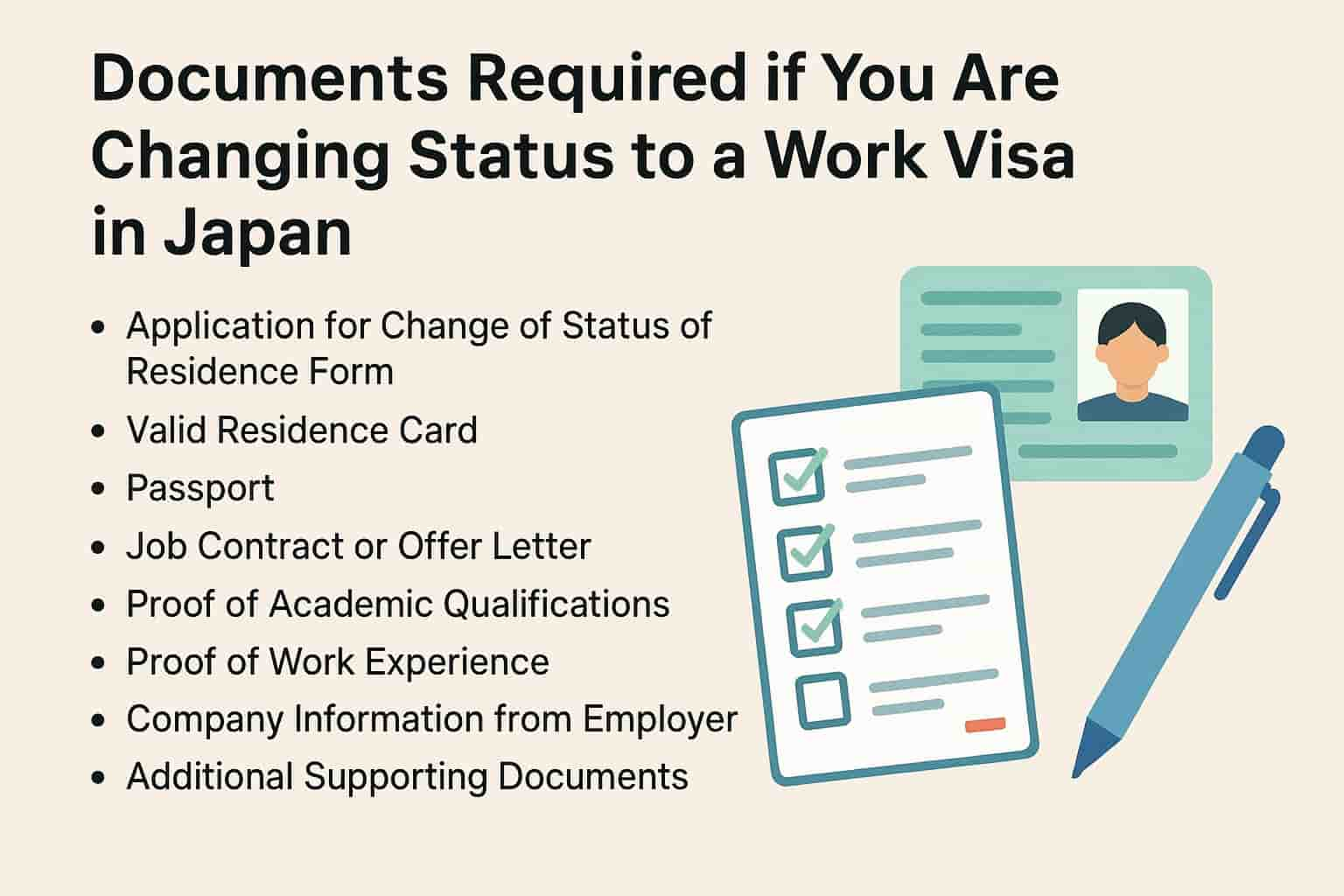
- Application for Change of Status of Residence Form: This is the main form you submit to request a change of visa category. You can download it from the Immigration Services Agency of Japan website or pick up a copy at any immigration office. Make sure you fill it out completely in Japanese or English (Japanese preferred), sign it, and avoid leaving any sections blank — incomplete forms are one of the most common reasons applications are delayed.
- Valid Residence Card: Your current residence card proves your current visa status and stay validity. Immigration will check the expiration date, so if your card is expiring soon, renew it or submit your application early. Keep the original card — immigration will update it with your new status if your application is approved.
- Passport: Used to verify your identity and confirm your legal entry into Japan. Make sure your passport is valid for at least six months beyond your application date. Bring both the original and a photocopy of the photo and visa pages.
- Job Contract or Offer Letter: Issued by your employer and should clearly state your job title, description, contract period, working hours, and salary. Immigration often checks whether the salary meets the minimum standards for your visa category. If your contract is in Japanese only, that’s fine — but if it’s in another language, you must attach a Japanese translation.
- Proof of Academic Qualifications: This includes your university degree, diploma, or official transcript. If your documents are not in Japanese, provide a certified translation. For technical or trade jobs, vocational school diplomas can also be accepted if relevant to the job.
- Proof of Work Experience: Crucial if your degree is in a different field from the job you’ll be doing. Examples include previous employment certificates, reference letters, portfolios (for designers, artists, engineers), or technical licenses. For IT jobs, letters from previous employers listing job responsibilities can be particularly useful.
-
Company Information from Employer:
Immigration checks the employer’s legitimacy. Your employer should provide documents such as:
- A copy of the company’s registration certificate (登記事項証明書)
- Recent financial statements (to prove business stability)
- Business license (if applicable)
These documents are provided directly by your employer — you don’t need to request them from public offices yourself. -
Tax Payment Certificates:
Immigration may require the 課税証明書 (Kazei Shomeisho) and 納税証明書 (Nozei Shomeisho) to prove your tax payment and financial compliance, especially when changing from a Student Visa to a Work Visa. -
Additional Supporting Documents:
Depending on your situation, immigration may request:
- Student transcript or attendance record (if switching from a Student Visa)
- Proof of current activities (e.g., freelance contracts if on a different work visa)
- A personal statement explaining why you are changing status
Providing these upfront can make the process smoother.
Key Work Visa Categories
Japan offers more than a dozen work visa types, each designed for specific professions and skill levels. Understanding the main categories will help you determine which one best suits your situation. Here are the most common categories in 2025:
- Engineer / Specialist in Humanities / International Services: For professionals in IT, engineering, marketing, translation, finance, and other specialized fields. Typically requires a university degree or relevant work experience.
- Instructor: For those teaching at public schools or other educational institutions. This is different from the “Professor” visa, which is for university-level teaching and research.
- Skilled Labor: For specific trades such as chefs (specializing in foreign cuisine), craftsmen, construction workers, jewelers, or pilots. Skills must usually be proven through work history or certifications.
- Specified Skilled Worker (SSW): Designed to address labor shortages in industries like caregiving, agriculture, hospitality, shipbuilding, and more. Divided into two types—Type 1 allows work for up to 5 years, while Type 2 offers longer stays and family sponsorship.
- Business Manager: For entrepreneurs and company executives establishing or managing a business in Japan. Applicants must present a viable business plan, office space, and proof of sufficient funds.
Application Process Overview – If You Are Outside Japan
- Secure a Job Offer: Apply for jobs with Japanese companies that can sponsor foreign employees. Check our guide to find companies that hire foreigners.
- Employer Applies for COE: After hiring, your employer gathers required documents (passport copy, resume, degree, professional certificates) and submits them to the Immigration Bureau in Japan. COE processing takes about 1–3 months.
- Submit Visa Application: Once the COE is issued, you apply for the work visa at the Japanese embassy or consulate in your country. Required documents include your COE, passport, visa form, and a recent photo.
- Enter Japan: After visa approval, you can enter Japan. Immigration officers will issue a Residence Card at the airport. Register your address at your local city hall within 14 days.
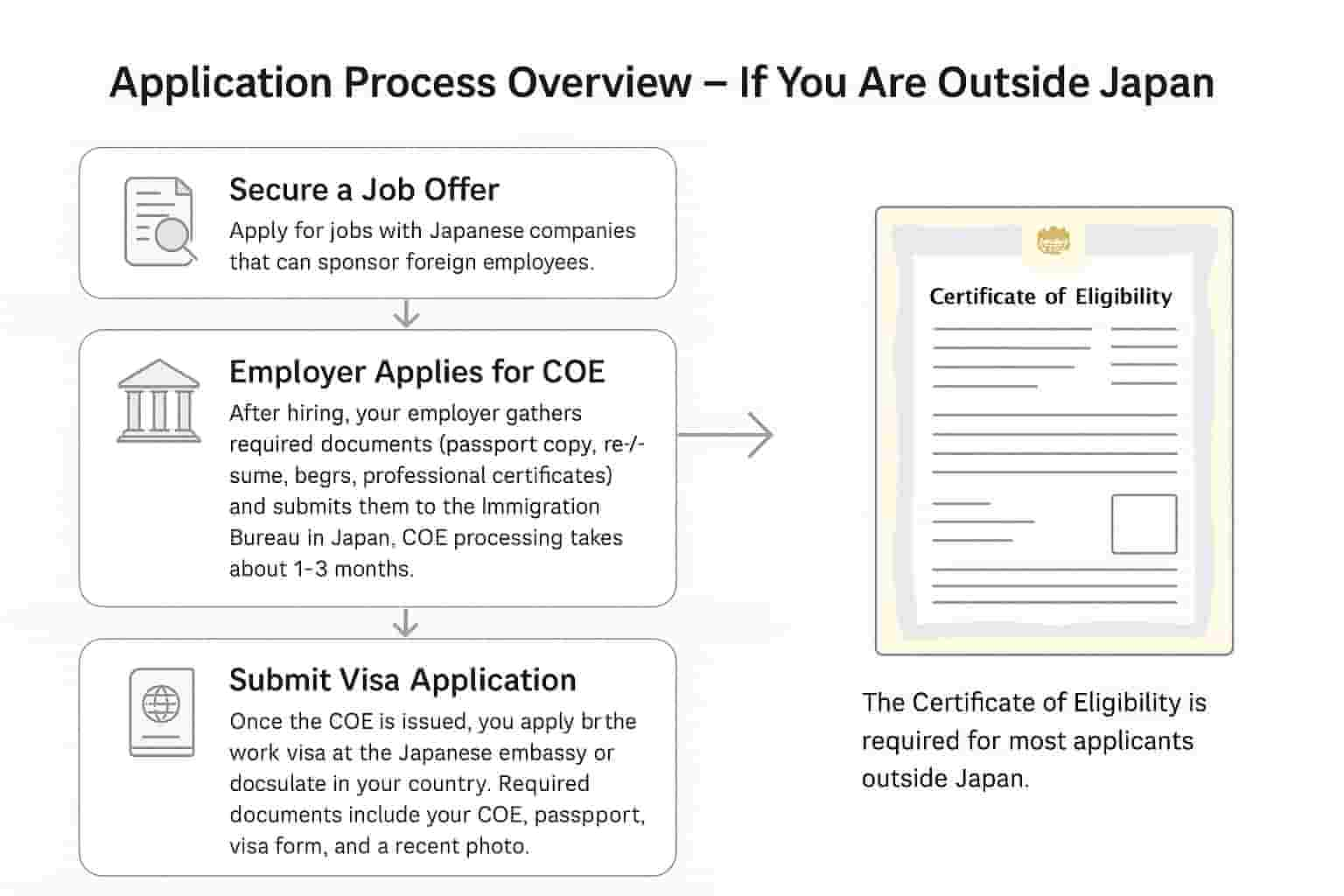
Application Process Overview – If You Are Already in Japan
- Secure a Job Offer: While holding a valid visa (e.g., Student, Dependent), receive a job offer from a Japanese company that will sponsor your work visa.
- Apply for Change of Status: Instead of a COE, you submit a Change of Status of Residence application directly to the Immigration Bureau. Required documents include your passport, Residence Card, job contract, application form, supporting documents from your employer, and tax payment certificates such as 課税証明書 (Kazei Shomeisho) and 納税証明書 (Nozei Shomeisho).
- Processing Time: This change usually takes 1–2 months. You can stay in Japan during the process as long as your current visa remains valid.
- Receive New Residence Status: If approved, the Immigration Bureau will update your Residence Card with your new work visa status. No need to leave Japan.
Tips to Improve Your Chances
- Double-check that your job title matches your qualifications: Immigration officers carefully check whether your work experience and education fit the visa type. For example, if you have an engineering degree but apply for a “Language Teacher” visa, you might be rejected unless you have teaching credentials.
- Keep all documents clean, complete, and translated into Japanese if necessary: Submitting neat, well-organized paperwork shows professionalism. If any document is not in Japanese, attach an official translation to avoid delays or misunderstandings.
- Work with employers who have a history of sponsoring foreign workers: Experienced employers already know what documents to prepare and how to handle immigration procedures, which reduces the risk of mistakes or missing requirements.
- Apply early, as processing can take several months: Certificate of Eligibility (COE) processing alone can take 1–3 months, and visa approval may take a few more weeks. Starting your application early ensures you won’t miss your planned start date.
- Maintain regular communication with your employer: Quickly respond to any requests for extra documents or information. Delays in your reply can slow the entire process.
- Have proof of financial stability: While not always mandatory, showing you have savings or financial support can reassure immigration officials of your ability to live in Japan without issues.
Final Thoughts
Japan offers exciting opportunities for skilled professionals, but getting the right work visa is crucial. By understanding and meeting the requirements, preparing your documents, and working with reliable employers, you can make your move to Japan a smooth and successful experience.
